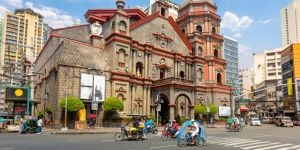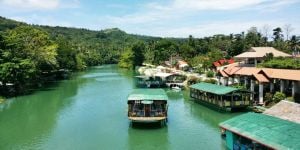Experiences with regards to the cost of education
Thanks to everyone sharing their experiences.
My wife, a Filipino, and myself (US citizen) are planning to retire in the Philippines in a few years. We have a daughter that will be in her first year of school around that time.
I was wondering if anyone could share their experiences with regards to the cost of education; private schools, tuition, school supplies...
thanks in advance
rikbak3 wrote:Thanks to everyone sharing their experiences.
My wife, a Filipino, and myself (US citizen) are planning to retire in the Philippines in a few years. We have a daughter that will be in her first year of school around that time.
I was wondering if anyone could share their experiences with regards to the cost of education; private schools, tuition, school supplies...
thanks in advance
Answers to this depends on where you go. State colleges are about 1/5th the cost of private schools. Private schools will run between php100k-150k per semester depending on course. There a 2 semesters per year. This tuition only. The education you get in state colleges are just as good. You can figure 5-10% for school supplies. Board and lodging will be extra. Figure on apartment or condo. No such thing as dormitories unless you go to UP Diliman. Estimate php10-25k depending on where you stay and whether my yourself or have roommates.
Sorry for the typos as I was hurriedly typing this on my phone. I'm reposting my response with corrections and clarifications.
Answers to this depend on where you go - major cities or provincial cities. State colleges are about 1/5th the cost of private schools. The education you get in state colleges are just as good. Private schools will run between php100k-150k per semester depending on course. There are 2 semesters per year. This is tuition only. You can figure 5-10% for school supplies. Board and lodging will be extra. Figure on apartment or condo. No such thing as dormitories unless you go to UP Diliman in QC. Estimate php10-25k on lodging depending on where you stay and whether living by yourself or have roommates. Board or food can vary depending on how and where the student eats.
Generally, education in the Philippines is recognized in the US without taking additional classes. Examples are engineering, nursing and medicine. You are allowed to take the US boards. If you pass you can practice in that field. If you don't pass you can still work but no license and will be in a secondary capacity.
I occasionally see Filipinos with degrees that settle on working in production in factories bc of no initiative to pursue professional jobs. Its a shame bc they could be earning at least 3x more than factory pay. Partly bc they don't know how to help themselves. I have helped fresh-off-the-boat Filipino engineering grads get employed as engineers by coaching them on resumes and interviews. These are the ones that welcome the help and usually do not take no for an answer. I am acquainted with many Filipino physicians, nurses and PTs practicing in the US who graduated from various Philippine medical colleges, even from obscure ones. All are well regarded by the community.
As a side comment, the success of the student in their career will depend largely on the student. Not the school they go to.
Thanks for the information, it is very helpful.
Our daughter is not college age yet so we will need to look at the cost of education up to that point. My understanding is that private schools are not too expensive but a much better place to learn, compared to the public school system.
We considered international schools too but, given the limited locations in which they are available and the cost of tuition per year, we are looking at other options.
There is no need to go to international School unless you want to isolate your child and join the spoiled rich kids. As I mentioned, state/public colleges/universities produce excellent graduates at 1/5th the cost. Private schools are largely run by religious institutions. I will have no problem sending my child to a state college. The most well known and very good school is the University of the Philippines. Some schools like Adamson produce great Chemical engineers.
Ultimately, an expensive school does not always translate to a successful graduate. It's how well the student studies and disciplines themselves.
rikbak3 wrote:Thanks for the information, it is very helpful.
Our daughter is not college age yet so we will need to look at the cost of education up to that point. My understanding is that private schools are not too expensive but a much better place to learn, compared to the public school system.
We considered international schools too but, given the limited locations in which they are available and the cost of tuition per year, we are looking at other options.
Hi, (My ex was a teacher) they say the that private Schools K to 12 (unless very top rate, and not talking about international schools) are hit and miss when comparing them to a public K to 12 school.
The advantage of the private school is that they have less students in the class and compared to a public school better facilities. However the best teachers are in the public schools because all the teachers there have passed there LET exam (national exam needed to teach in a public school) and the pay and pension in the public schools is better than a private school (yep not like in Australia).
There are also some schools around that are very cheap and considered to produce some of the best students, seems strange! Yep that is what I thought, but apparently these schools place a lot of responsibility on the students to work and work hard, this is the design of the teaching principles there, the people who send there children there know that they kids have to be bright and hard working. If you child is very bright (an your budget is a issue) this might be an option.
In regards to colleges for the cost of living aspect of this post the link below will take you to a very good web site, it does have some K to 12 schools as well.
http://www.finduniversity.ph/
samahantayo wrote:There is no need to go to international School unless you want to isolate your child and join the spoiled rich kids. As I mentioned, state/public colleges/universities produce excellent graduates at 1/5th the cost. Private schools are largely run by religious institutions. I will have no problem sending my child to a state college. The most well known and very good school is the University of the Philippines. Some schools like Adamson produce great Chemical engineers.
Ultimately, an expensive school does not always translate to a successful graduate. It's how well the student studies and disciplines themselves.
International private schools for K to 12 are expensive, yes (around $30,000 USD per year) but the advantage is that the child should be able to go to any university/college in the world as they are based on international standards.
pej1111 wrote:International private schools for K to 12 are expensive, yes (around $30,000 USD per year) but the advantage is that the child should be able to go to any university/college in the world as they are based on international standards.
International standards??? What is that? No such thing.
The curriculum in the Philippines was set up based on US standards. This is why Philippine graduates do not need to take additional courses and are able to take and pass board exams in the US.
samahantayo wrote:pej1111 wrote:International private schools for K to 12 are expensive, yes (around $30,000 USD per year) but the advantage is that the child should be able to go to any university/college in the world as they are based on international standards.
International standards??? What is that? No such thing.
The curriculum in the Philippines was set up based on US standards. This is why Philippine graduates do not need to take additional courses and are able to take and pass board exams in the US.
As posted we are talking about school (pre-college)
Umm yes there is an internationally recognized education system have a look at the International Baccalaureate. You were not aware of this?
I did not know that a child here completing year 10 could go to the USA and do a University course without having to do another 2 years of study.
If the Philippines is based on the American systems why did it only go through to grade 10 in the past? Or it will only be in 2020 when children are completing the grade 12 that it will become an international standard.
I have never in my life heard of International Schools, what Countries are we talking about here? there is Non in Europe, there is Non in Australia, is this some thing that comes from America, you can go to any school here you want, but if you want job in Australia you will do additional courses to be at Australian standards, but if you going to be Cleaner or labourer maybe no need to do any thing.
Any thing below grade 12 is not going to get you in any Universities or in some Collages, even then your grads better be in 90%+
Even if you have International Schools here by now I read there is, but if you have local Teachers and I mean from philippines, where will you be better of ? in Public Schools ? Private or International ? in my mined I think if you call this International School then I will think most are from Over Sea teachers, I have few Friends here who are Teachers, the knowledge they have is very very poor, mined you they are qualified fully, how is this passable ??
I believe any one or every one can be Teacher here, even no need for any Qualifications to be Teacher, hell I can be one if I really want the job haha.. System is a Joke..
I have a Child, in few years time he will be starting some kind of Education in Philippines, now this scares the hell out of me right now, we live in Province, the schools around here are like what they call Semi Private and Public Schools, there is some differences, the Private some class rooms got Aircons, which is ok for my Kid, they take trips to other places 2 times a year, they have limited sports activities, all in all not much, but more then Public School, and yes class rooms are caped not like Public Schools no cap.
I was thinking if I kid grows up in Philippines he will be the same as Philippine's, the job he may get will be maybe what they are getting what ever that is at the time, other Option is to send him to Manila Schools, but then there is no Family there, only is to rent, but I hate big Cites, big if's and big no's, and maybes, this is uncertain future for young Man or Woman.
Sam, international schools have been around for years. There's one in Makati. I know there's another one in Singapore. I believe they are only up to high school. It's usually where foreigners and diplomats send their kids.
@Fortunefavorsthebold, why? The best school in the Philippines is the Philippines Science High School... It is public not private .
geolefrench wrote:@Fortunefavorsthebold, why? The best school in the Philippines is the Philippines Science High School... It is public not private .
And the University of the Philippines!!!
A very good school! Charges a fraction of what private schools charge. Not easy to get admitted. Only smart kids get in. Same with Philippine Science.
All Universities no meter where they are in the world, when they have openings, they will select who is the best of the students, say one got 65% passes, the other is 85% passes, well they will always select 85% or above, this is selection criteria for Universities all over the world, so yes they will select smart ones, so 65% or 85% have no hope, but in real termes they will look for 95% passes, the closer to 100% this is the ones they want.
Few years ago I was teaching in public schools in the Philippines... So I know the huge differences between public schools in the Philippines. Thats why I asked why ... It depends the kind of public schools we talk about!
So the bold, what you mean by public schools are in deplorable state or they are really bad state to send kids to, am I right ?
Hello everyone,
Please find this new thread on the Philippines forum. These posts were off-topic on the Cost of living thread.
All the best,
Bhavna
rikbak3 wrote:Thanks to everyone sharing their experiences.
My wife, a Filipino, and myself (US citizen) are planning to retire in the Philippines in a few years. We have a daughter that will be in her first year of school around that time.
I was wondering if anyone could share their experiences with regards to the cost of education; private schools, tuition, school supplies.
thanks in advance
My husband and I moved from CA to the Philippines back in 2008. Our son, who was born in SF, is now in 4th grade, and our daughter, who was born here, is in 2nd grade. They both go to the same Montessori school. Class size is 26 to 32 students.
Tuition for the current school year was around PhP120,000 each (around US$2,400 at the current exchange rate). New uniforms and initial school supplies were around PhP5,000. I get the next size up and reuse old uniforms. But the kids grow up so fast. I bought 2 sets of new uniforms over the course of 3 years. School supplies will need to be replenished or replaced. I estimate this to be around PhP3,000. They need black school shoes and tennis shoes (for P.E.). At the mall, price would range from PhP800-2,000 per pair depending on the brand and quality.
School bus service is available. Fee will depend on how far your home is from the campus. Our kids don't use it as we live close by. We drive the kids to school -- a 3 to 5 minute drive.
The school offers taekwondo, futsal, and other classes during Saturdays and also during summer break for an extra fee. I can't remember how much they cost. The kids said they're interested in trying taekwondo next summer.
They have private music lessons at home on Saturdays. Each 1-hour session is PhP600.
My son has piano lessons and my daughter has just started violin. Hopefully, she will like it.
Around 2 years ago, my daughter took ballet lessons during summer. Lessons were not that expensive. But the cost of costumes, recital fees, rehearsals, etc. were something else. I was able to convince my daughter to try some other cheaper, but still fun, summer classes the following summer.
FortuneFavorsTheBold wrote:Plan on 150,000 to 250,000 pesos per year for a good private school.
Do you have children who go to school here in the Philippines? How did you come up with those numbers? There are good private schools whose tuition fees are lower than PhP100,000.
rikbak3 wrote:Thanks for the information, it is very helpful.
Our daughter is not college age yet so we will need to look at the cost of education up to that point. My understanding is that private schools are not too expensive but a much better place to learn, compared to the public school system.
We considered international schools too but, given the limited locations in which they are available and the cost of tuition per year, we are looking at other options.
One of the advantages of private schools over public school is the smaller class size. Teachers can give more individualized attention to students in smaller classes. For example, my son's class adviser noticed that a classmate was not paying attention and not completing his work when seated towards the back. But when closer to the front, he completed his seat work on time. The teacher noticed this and suggested to the parents that perhaps they could have his eyes checked. With new glasses, he was able to perforrm better in class.
Private schools also have better security. At my kids' school, only parents can pick up their kids. We applied for a permit for my dad so he can pick up the kids in case my husband and I can't.
Science high schools and well-established schools such as Ateneo De Manila have advanced curriculum and loads of homework, projects and other school work. Before enrolling your child, whether it be in a private school or public school, inquire about their curriculum and the potential work load for your child. Each child is different. Some kids thrive well in such schools, while others end up a wreck from too much stress and pressure.
My son is in grade 4 at a Montessori school. He's 10 years old, but most of his classmates are 9. The 3rd quarter exam was a couple of weeks ago. For the math exam, I tutored him on prime factorization, GCF and LCM, including GCF and LCM word problems. For zoology, it was phylum and classes of invertebrates. (Try saying "Class Holothuroidea.")
For my son, geometry for this quarter about quadrilaterals was tougher than the previous two. Personally, I think the 1st quarter lesson about identifying the angles formed by 2 lines cut by transversal was the toughest. The most enjoyable was triangle construction in the 2nd quarter grading.
Does anyone know much about the student population that attends the public Philippine Science High School System? The entrance is competitive and meant for gifted math and science students but was wondering if the kids are mainly from the public system, private education or maybe a mixture of both? Just curious as I was so impressed by the young filipina student who won the 2018 Breakthrough Prize award contest for a total of $400K USD! Public schools can't be all bad...
Ladies and gentlemen I see a lot of erroneous info and misinformation in this thread so here is contribution. I have a kid in school so I have researched all the options. Do not consider public schools unless you really cannot afford private schools. Private schools come at all price points. The most expensive private schools (not international) are usually private ones run by the Catholics. They offer great education in a traditional school atmosphere and are usually exclusively all boys or all girls schools (not always). There is a lot of snob value attached to these schools. The main advantage of these schools would be the social circles you become a part of and the connections you make and your kid makes that will do him well in the future. They usually have . alot of activities, swimming, etc. This is where the rich kids or the upper middle class go. These would cost you anywhere from 100k to 200k a year. Most would be 120k to 150k range. We are talking about schools like Ateneo, LaSalle, St.Pauls, etc. These are in metro Manila, but other cities have equivalent schools which will be cheaper than the manila schools. You also have regular private schools that cost anywhere between 30k to 80k a year approximately. These may not may not offer good education, it all depends on the teachers. You can ask around your neighborhood about a particular school in the area. This is the middle option and the most practical for most. They offer smaller class sizes than public schools and usually are air-conditioned. You will have mostly middle class kids and families. Most of them will know english and many will speak it regularly too. As an expat your kid would feel comfortable there. Public schools? You know what it is like. Why would you put your kid there if you could afford better? Most have serious problems with funding, overcrowding, lack of discipline, the works. Please note.. schools like Philippine Science High School and the local Science high schools are exceptions to the regular public school system. You need to be really bright and exceptional to get in there and they are very well funded by the government.
The students are an even mix of both. I heard that in recent batches there are more kids from private schools since they have the means and resources to prepare well for the entrance exam with private coaching, etc.
my friend's little boy started in I think its preschool in Cebu city 2 hours a day, now K1 also 2 hours a day. its great and its a Montessori school - called little angels Montessori in Tisa. I pay 2255 pesos per month. I think this is considered lower end of private (both cost and reputation). I agree the public schools are really iffy. my 4 year old is half American - I think he's the only non pinoy in the whole school. but everything is in English. and he does not speak bisaya or tagalog. I think the school is super good.
Make your relocation easier with the Philippines expat guide

Lifestyle in the Philippines
About to move to the Philippines? Wondering how you're going to adapt to your new environment and lifestyle? ...

Developing your social circle in Manila
When moving to a new city, invariably, the friends you meet and cultivate first will make the most impact and can ...

Leisure activities in the Philippines
Consisting of more than 7,000 islands, the Philippines is a real treasure that you can explore during your stay ...

Diversity and inclusion in the Philippines
The culture of the Philippines is very diverse. This is due to the large mix of different nations in this country, ...

Accommodation in Iloilo
Iloilo, nicknamed the 'Heart of the Philippines', is a province stretching over 4,663 km² in the ...

Tax in the Philippines
When moving to the Philippines, especially if you are going to work or set up a business there, you will probably ...

Obtaining a Philippines driving licence
Whether you are converting your existing foreign driving license or applying as a first-timer for a Philippines ...

Accommodation in Cebu
Located in the Visayas region, 750 km from Manila and West of the Negros Island, Cebu is one of the major ...
Forum topics on school and studies in the Philippines



